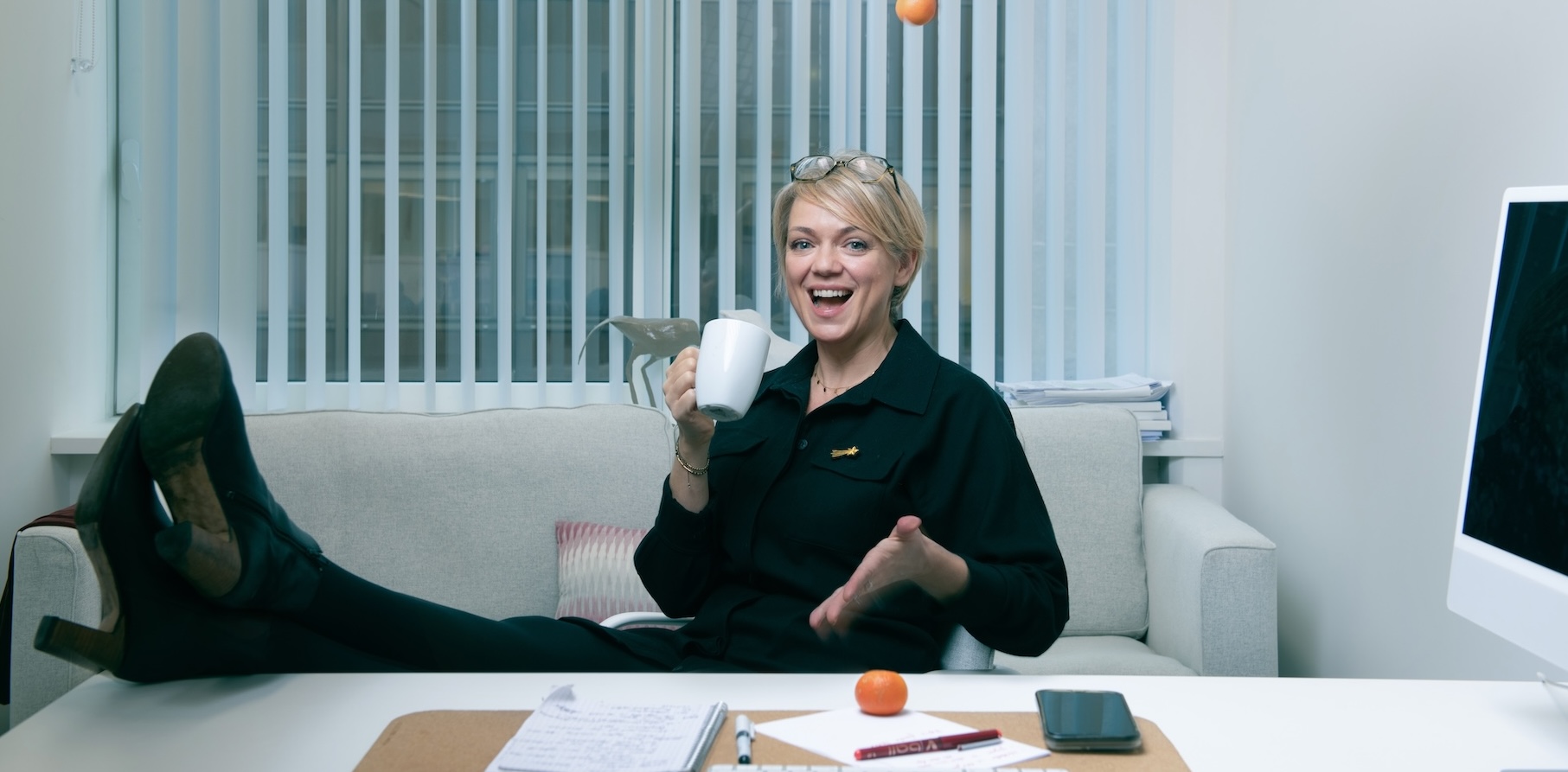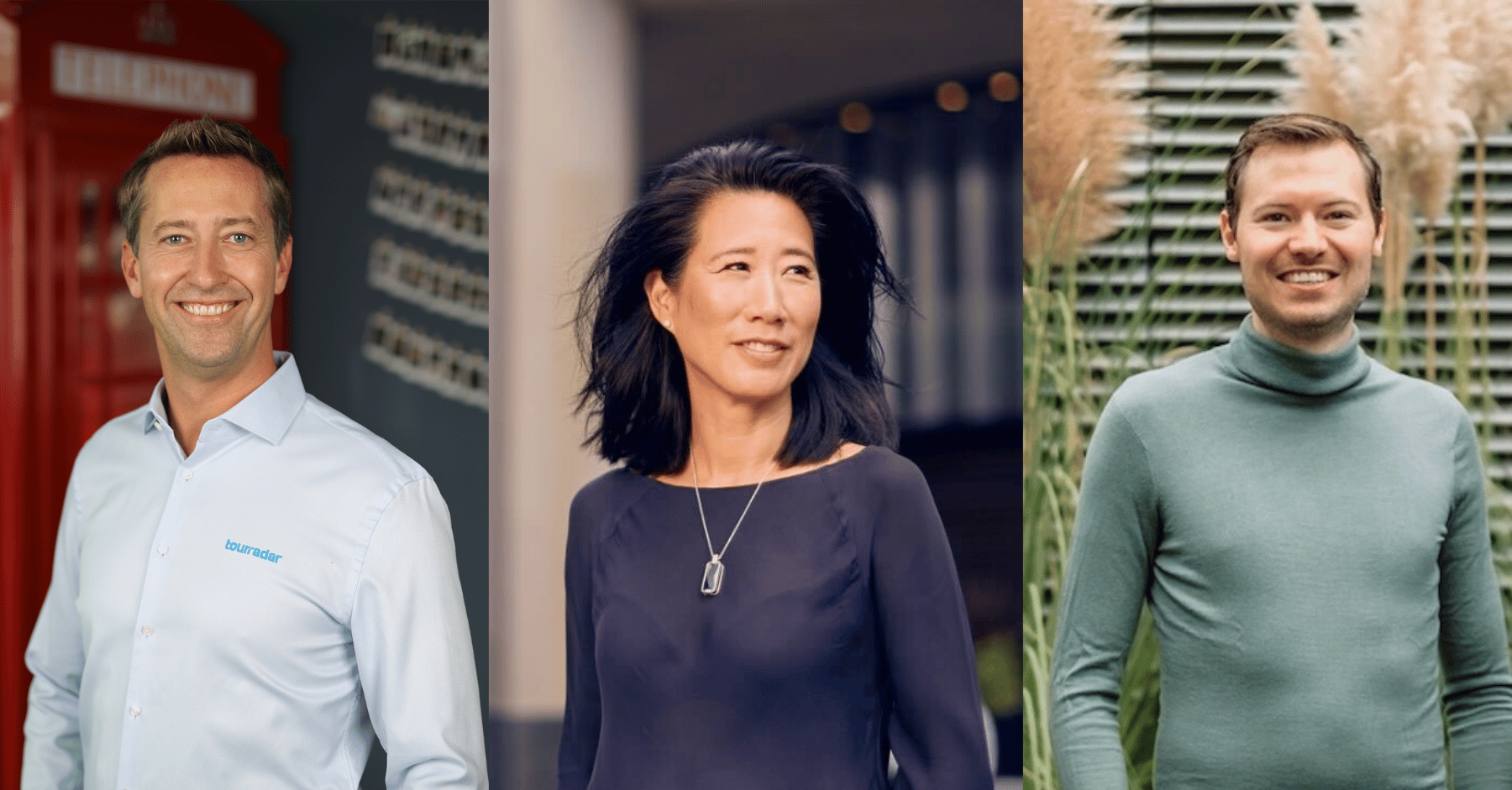Morning Coffee with Fanny Jaulin, founder of Orakl Oncology
Welcome to the second edition of our Founder Coffee Chat series – a collection of candid conversations with the visionary founders our Health & Bio team has backed, as well as others shaping the future in their fields. Through these interviews, we’ll explore the early sparks, hard lessons, and big ideas behind some of the most ambitious startups.
This time it’s Fanny Jaulin, CEO at Orakl Oncology. We were Orakl’s first backers in 2023, based on our strong belief in the company’s innovative interdisciplinary approach to solving drug discovery in oncology treatments.
So, before our coffee gets cold, let’s dive in.
If you were explaining Orakl Oncology over breakfast to a non-scientist friend, using just your croissant, jam, and coffee as props, how would you describe what you do?
Think of breakfast as the landscape of cancer. At first glance, it looks simple: a croissant, some jam, a cup of coffee. But look closer. Each croissant is slightly different: crispier here, softer there, just like every patient’s tumor is unique. The jams on the table represent the therapies we have today: strawberry, apricot, orange… a few flavors, but not nearly enough to match the variety of croissants. And the coffee? That’s the complexity of cancer itself: dark, layered, impossible to see through if you just stare into the cup.
What we do at Orakl is bring clarity to that breakfast table. We don’t assume one jam fits all croissants. Instead, we analyze each croissant carefully, and we use AI to understand which jam will actually work, or whether we need to invent an entirely new flavor. And you know how people used to read in coffee grounds? They would swirl the cup and try to answer their questions and read the future. At Orakl Oncology, we do something similar, but with science instead of fortune-telling. We turn the coffee into a clear liquid and turn that complexity into real, predictive insights: we work with pharma companies to match jam and croissants, that way, we can help them design treatments that are actually tailored to patients, not just approximations.
What makes Orakl’s approach truly unique and hard to replicate? Why now?
Orakl Oncology is defined by something exceptionally rare: the seamless integration of world-class clinical data, living tumor biology, and exclusive partnerships that few can ever replicate. At the heart of our platform is a collaboration with leading cancer hospitals, most notably Gustave Roussy, Europe’s largest cancer institute, giving us access to the richest collection of clinically-annotated, multi-omics tumor datasets. Unlike others, we don’t stop at data: we also collect live tumor cells, creating a direct experimental feedback loop between AI-driven insights and living biology. This is what makes our conclusions both trusted by Pharma and actionable in practice.
On top of that, Orakl has secured exclusive, regulatory-compliant partnerships that give us privileged access to both patient data and biological material. This ecosystem is extremely difficult for a newcomer to recreate because it is built on trust, long-term relationships with hospitals, and strict compliance with patient care standards.
Finally, we are pioneering predictive AI models that forecast clinical trial outcomes with accuracy and efficiency unseen in the industry. Building such models isn't just a technical challenge; it requires biologists, data scientists, engineers, and clinicians to work in harmony and speak the same language. Our CTO, Gustave Ronteix, uniquely bridges these fields, enabling Orakl to deliver a truly integrated platform that turns complex oncology data into transformative breakthroughs.
.png)
What was it like transitioning from academia to CEO at Orakl Oncology?
Making the leap from academia to becoming Orakl’s CEO was not a conscious decision for me. At first, I questioned whether I was legitimate in that role. If you had asked me then, I would have said my place was focusing on science, not on leading the whole company. I knew very few academics who had made the leap to CEO and had very few people I could turn to for advice. But what initially felt like an uncomfortable stretch has become one of the most fulfilling parts of the journey. The company needed someone who could look at the next steps from every perspective: scientific, organizational, and business. No one else carried the same understanding of Orakl’s mission; fulfilling this duty was the only way to ensure the company stayed true to its purpose. So I stepped in as CEO, not out of ego, or desire for the position, but out of commitment to Orakl. That shift in mindset, from personal legitimacy to collective mission, changed everything.
I had to unlearn some habits. In academia, I used to dive into extreme detail and rely too much on theoretical knowledge, believing that mastery only comes from books, experts, and years of research. As an academic, you’re trained to go deep and build authority only once you’ve reached the highest level of expertise. In a startup, that mindset can slow you down. Entrepreneurship taught me that you learn by doing, by iterating, by listening to the ground truth rather than just the textbooks. Going back to HEC gave me some tools, but what really taught me how to be an entrepreneur was being an entrepreneur.
At the same time, many skills transferred better than I expected. Fundraising, for instance, isn’t so different from securing academic grants: you pitch a bold vision, you assemble a great team, you convince people to back it, and you must deliver if you want to play the next round. More broadly, academia trained me to manage complex, evolving systems, to handle uncertainty, risk, and long-term projects. Those are exactly the muscles you need in techbio.
And I haven’t left academia entirely: I still run my lab at Gustave Roussy. That dual role creates powerful synergies. It brings scientific rigor, credibility, and deal flow to Orakl, while also fostering the virtuous circle that France needed, where startups and academic labs feed into each other, rather than existing in separate worlds.
What would you say is your personal superpower as a founder and team?
My personal superpower is contextual intelligence. For a long time, especially in science, traits like this were undervalued compared to rationality, technical expertise, or analytical rigor. There is still a kind of generational bias that sees psychological or human-based skills as “soft” or secondary. Yet I’ve found contextual intelligence to be one of the most powerful traits a leader can have.
For me, it means listening carefully, paying attention to what is not said as much as to what is said, and understanding the motives and dynamics that shape people’s decisions. In a heavily regulated industry like pharma, people rarely express exactly what they want or think. Contextual intelligence allows me to navigate those unspoken complexities, to cut through the surface layer of conversations, and to identify the real drivers of decisions. That ability creates trust, and trust is ultimately what makes meaningful partnerships possible.
Internally, colleagues come to me when they feel stuck or overwhelmed, because I can bring clarity and help simplify complexity so decisions can be made. Externally, people value my honesty and commitment, and I think they sense that I am genuinely thriving in my mission. As a company, Orakl mirrors this mindset: we are ambitious yet reliable, fast to act and iterate, and we’ve built a team with the rare technical expertise needed to operate at the intersection of biology, AI, and technology, a capability that is extremely hard to replicate.
What achievement are you most proud of at Orakl?
What makes me proudest is how, as a very young company, we’ve managed to earn the trust of some of the biggest players in pharma. The first quarter of 2025 was transformative: we signed two contracts with Big Pharma, two term sheets with hospitals, and hired a top-notch US-based head of business. These milestones can brush aside the suspicions about academic spin-offs that never become true businesses.
We’ve often found ourselves compared directly to established, well-funded players, and yet, pharma still chose to work with us. They saw the strength of our technology, but also the reliability of our team and the trust we’ve built in every interaction. Another example is our lab spaces; the facilities were being allocated only to large biotech and pharma companies with significant budgets. But when they saw what Orakl was building, they carved out space for us, too. It was a great moment, because it showed that even institutions that usually only welcome the “big players” made room for us because they recognized the value we bring. For me, that ability to “make our way into the big leagues” so early is a major achievement, and a strong signal of what’s ahead.
.png)
Fast forward a few years, where do you see Orakl, and what will success look like for you as a founder?
My vision for Orakl is not to eradicate cancer; that’s unrealistic. Cancer is here to stay, and with longer life expectancy and environmental factors, it will likely become even more common. The real transformation lies in changing how we perceive and treat it: turning cancer into a chronic disease, managed like diabetes or cardiovascular conditions. Success will be when a cancer diagnosis no longer feels like a death sentence, but rather a condition that can be lived with for decades, thanks to a rich therapeutic arsenal.
To get there, Orakl’s goal is to make sure many more drugs reach patients, at a cost that allows fair access. Based on the predictive power of our platform today, we believe we can help bring five times more drugs to market while cutting development costs in half.
Our path to this vision has two stages. First, we are proving the ability of our predictive engine to anticipate patient response to drugs that have never been in the clinic, so that clinical trials can be designed for success rather than failure. Today, we partner with biopharma to derisk their clinical trials. The next step is to go even further upstream: to resolve the biological risk of new target identification. That’s something pharma companies hesitate to embrace, but our technology can identify new, causative targets with precision, and that will form the foundation of Orakl’s own proprietary pipeline.
For me personally, success is building a company that not only has this kind of impact but also keeps its creative, agile spirit and remains a collaborative place where the best talent wants to work.
How have you structured Orakl to scale, both in terms of team and product?
From the beginning, I’ve been passionate about building teams that are greater than the sum of their parts. At Orakl, that has meant bringing together people with very different expertise and experiences, and then focusing on how they interact, making sure communication is rich, efficient, and collaborative. As we grow, a big focus has been on helping early employees transition from being operators to becoming managers who can build teams and processes themselves.
One of my co-founders, Diane-Laure, has been instrumental here. She has a natural instinct for building cohesive teams and has led our efforts in HR and recruitment, making sure our culture scales without being diluted as headcount rises.
On the product side, we’ve been intentional about scalability from day one. Our data pipelines, wet-lab workflows, and biological sourcing have all been designed to handle a tenfold increase in patient avatars, drug candidates, and combinatorial treatments without breaking. Once we find the right recipe in the lab, we turn it into a process that can be repeated and scaled. The same logic applies to our tech infrastructure and even to our HR practices.
That foundation means we’re now in a strong position to scale. We’ve proven the core model, and the next milestones will be about expanding our avatar collection, growing the number of drug candidates we test, and scaling the partnerships that fuel the platform.











.svg)
